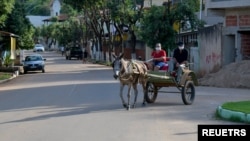Ana Paula Souza, her husband and their young son are among the hundreds of families that have left the small Brazilian town of Alpercata in recent months.
Alpercata is home to about 7,500 people. It is in Brazil’s southeastern state of Minas Gerais. People have left the area to come to the United States for many years. But the COVID-19 pandemic has greatly weakened the economy.
Now, people are leaving almost daily.
The town’s local bakery does not have enough workers. Government employees have quit their jobs. Local soccer teams are out of players.
"Alpercata is emptying out," said Souza, who is 23 years old. "Everyone is leaving."
Souza now lives in Orlando, Florida. She has a job at a bakery. Her husband is working in the building industry.
Many people are leaving Alpercata and other nearby towns because of the effects of the pandemic. COVID-19 has killed more than 600,000 people in Brazil.
In Latin America overall, there has been an increase in immigration to the U.S. The area has been hit hard by the virus. Record numbers of Brazilians, Haitians and Venezuelans are appearing at the southern U.S. border.
Brazilians ranked sixth among the nationalities detained at the border between October 2020 and September 2021, data from the U.S. Customs and Border Protection (CBP) show. A record 56,735 Brazilians were stopped.
Earlier waves of migration were mostly poor young men who quickly returned home. But this wave is bringing professional workers that are harder for Brazil to replace, officials told the Reuters news agency.
Nurses, engineers and even city officials are leaving. Many of them have no plans to return. In Alpercata, the mayor’s office is the town’s top employer. Almost 5 percent of the 162 employees at the office fled to the United States this year.
Many are also taking their families. A U.S. asylum policy permits some nationalities, including Brazilians, to remain in the United States while they argue their claims. It is a legal process that can take years. A total of 99 percent of Brazilian families who were stopped at the U.S. southern border in fiscal year 2021 entered the country to argue cases in immigration court, CBP data show.
Alpercata's schools have lost 10 percent of their 926 students so far this year, said the town's education secretary.
Many of these families join Brazilian communities in Florida or
Massachusetts. They are able find some of the 10.4 million jobs currently unfilled in the United States.
Jorge Estefesson is Alpercata's top sports official. "We're scared that in the future, we're going to be an elderly city without young people," he said.
Officials in the United States also are concerned.
Most Brazilian migrants reach the United States through Mexico, where they enter as tourists without visas. Some go to Mexican border cities before turning themselves in to U.S. officials to claim asylum. The U.S. has been pressuring Mexico to stop permitting Brazilians to enter without visas to help stop their trip to the border.
Last week, Mexico said that by mid-December, it would require all Brazilians to have visas in order to enter Mexico. Such action has been effective at preventing immigrants from other countries from entering Mexico. But Brazil's weakened economy likely means people will continue to travel north, officials told Reuters.
A strong U.S. dollar is also driving immigration. The dollar is up more than 50 percent against the Brazilian real since late 2018, when President Jair Bolsonaro was elected.
Since Bolsonaro’s election, the number of Brazilians detained at the southern U.S. border rose more than 3,500 percent. Brazilians living overseas are now sending $300 million to $400 million back home each month, central bank data found.
The money is welcome. But Alpercata still faces a shortage of healthcare workers and engineers, said the town’s mayor.
Egnalda Oliveira works at a city school. She is also a single mother. She said the deaths of her husband and parents, along with a rise in inflation, have left her struggling to make enough money.
"If I could leave tomorrow,” she said, “I would."
I’m Dan Novak.
Reuters reported this story. Dan Novak adapted it for VOA Learning English. Ashley Thompson was the editor.
_______________________________________
Words in This Story
replace — v. to be used instead of
nurse — n. a person who is trained to care for sick or injured people and who usually works in a hospital or doctor's office
mayor — n. an official who is elected to be the head of the government of a city or town
elderly — adj. old or rather old
tourist — n. person who travels to a place for pleasure






